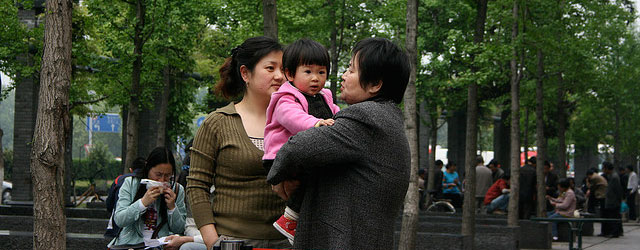
Photo Christopher / Flickr
China’s government told its people last week that married couples could now have two children each, rather than just one.
It is not nearly enough.
The country’s National Health and Family Planning Commission posted a statement on its website stating that 90 million couples would be eligible for the two-child policy, though officials did not indicate how the change would be implemented or when it would take effect. This change is an expansion of rules instituted in 2013 allowing couples where at least one spouse had no siblings to apply for a second child; ethnic minorities and rural couples whose first child was a daughter were among other exceptions.
Critics of the one-child policy, in China and outside the country, have long focused on the extreme consequences facing parents who skirted China’s family-planning regulations. Horror stories of forced sterilizations and of parents forced to abort pregnancies fueled the opposition. But, predictably, Beijing’s shift on the issue is not about human rights. It is about demographics and economics.
China’s aging population and the resulting decline in its labor force has been called a “demographic time bomb.” Chinese leaders hope that by relaxing family planning controls they can create a larger work force to support older generations who are living longer past working age.
The problem is that changing a one-child policy to a two-child policy no longer responds to the realities of Chinese life.
Like people in increasingly affluent societies almost everywhere, the Chinese are choosing to have fewer children and to have them later. Even couples who could have two children under the previous rules often chose not to. As Mu Guangzong, a professor of demography at Peking University, told The New York Times, “[…] many parents simply don’t have the economic conditions to raise more children.” Only about 12 percent of the couples eligible to have a second child under the 2013 rules had applied to do so as of this May.
Some observers also wonder whether decades of cultural pressure to have small families will play its own part. Although some parents will welcome the opportunity to have a previously forbidden second child, many others may have accustomed themselves to the idea of a small family and see no pressing reason to rush into expanding their family unit.
Moreover, as is the habit of the Chinese Communist Party, the new policy reflects a failure to realize that rule by fiat is not the most effective way to get people to do what you want. What Chinese leaders want is more babies. Yet even under the new rules, couples who want three or four children, who might therefore balance out couples who want one or none, still are not permitted. Nor are unwed mothers, as the new policy specifically pertains to married couples. The family planning bureaucracy, estimated to have included over 500,000 functionaries across the country as of 2005, will remain firmly in place. This is hardly an encouragement to increase the population, even with the new rules.
In addition, an increasing portion of the Chinese population also lives as an underclass in cities where they lack permanent resident permits, and thus cannot avail themselves of better public schools, health care and other services that would encourage them to have more children. This household registration system, called “hukou,” determines where people can live based on requirements as strenuous as many countries’ visa rules. Those who move to urban centers without the correct permits are often forced to leave spouses or families. While Beijing introduced some reforms last year, the problem persists; it is estimated about 13 million Chinese lack certificates for where they reside. The latest Chinese nod to family freedom does not extend to the concept of letting people live where they choose within their own country.
In fact, the one-child policy aggravated the growth of this unregistered population, because parents who could not pay large fines for having children beyond their first could not obtain hukou for them. While the central governments ordered local governments not to withhold hukou after 1988, that rule has not been strictly enforced, creating a group of unregistered young adults whose status is no clearer after the recent policy change announcement.
China’s rulers set their demographic time bomb 35 years ago. Now it is exploding in their faces as the country’s population ages and as the abundant supply of labor on which much of the country’s recent economic progress was built dries up. Immigration could make up for low fertility rates in some countries, including the United States if we ever get our own policy act together on this topic, but it offers little hope to China. That country draws very little in-migration apart from North Koreans, who are fleeing an utterly desperate situation.
So China’s announcement is a classic case of too little, too late. The fact that it is the most Beijing is prepared to do about a problem that has been evident for many years highlights the structural weakness in China’s system of government that will ultimately undermine many of the nation’s strengths.
- Bulenox: Get 45% to 91% OFF ... Use Discount Code: UNO
- Risk Our Money Not Yours | Get 50% to 90% OFF ... Use Discount Code: MMBVBKSM
Disclaimer: This page contains affiliate links. If you choose to make a purchase after clicking a link, we may receive a commission at no additional cost to you. Thank you for your support!




Leave a Reply